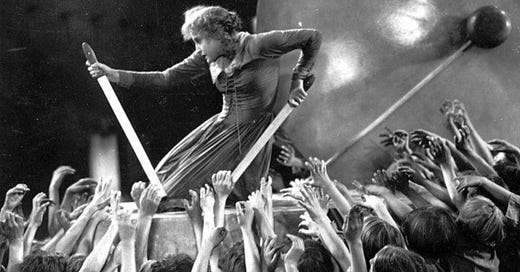My Grand Narrative in “Slouching Towards Utopia”: Snippets of Text, wiþ Commentary, &
BRIEFLY NOTED: For 2022-06-18 Sa
FIRST: My Grand Narrative in “Slouching Towards Utopia”: Snippets of Text, with Commentary:
The paragraphs of my Slouching Towards Utopia <https://bit.ly/3pP3Krk> that set out what my Grand Narrative thread is. With commentary. The passage begins:
[Myy story] naturally starts in 1870.
A short reminder to readers of the start date.
I believe it naturally stops in 2010.
A short sentence to remind readers of the end date.
As the genius Dr. Jekyll-like Austro-English-Chicagoan moral philosopher Friedrich August von Hayek observed, the market economy massively and successfully crowdsources—incentivizes and coordinates at thegrassroots—solutions to the problems it sets…
Introducing two supporting characters: the market economy with its extraordinary power to grassroots-crowdsource powerful solutions to the problems it is set, and its principal 20th century theoretician, the good genius Dr. Jekyll-side of Prof. Dr. Friedrich August von Hayek.
Back before 1870 humanity, given its population, did not have the technologies or the organizations to allow a market economy to pose the problem of how to make humanity rich.
However, back before 1870 humanity did not have the technologies—either the technologies of manipulating nature or the technologies of organizing humans—in either the level amount or the rate of growth for the market economy to be set the problem of moving humanity out of the realm of necessity in which it was trapped, the realm of dire Malthusian poverty.
So even though humanity had had market economies, or at least market sectors within its economies, for thousands of years before 1870, all that markets could do was to find customers for producers of luxuries and conveniences, and make the lives of the rich luxurious and of the middle class convenient and comfortable.
Hence before 1870 market sectors, and market economies, had merely turned their crowd-sourcing energies to making luxurious for the rich and conveniences to make the (small) middle-class comfortable. (Remember! The “middle class” is not the median 50th percentile! The “middle class” are, in previous centuries, those who are not rich but who do not fear starvation should the Wheel of Fortune take even a minor adverse turn!)
Things changed starting around 1870.
Another short sentence for the sake of rhetoric, attempting to hammer into readers the idea that 1870 and its triple—the coming of globalization, of the industrial research lab, and the modern corporation—in a strong and powerful sense marked the end of all previous human history.
Then [in 1870] we got the institutions for organization and research and the technologies—we got full globalization, the industrial research laboratory, and the modern corporation.
The coming of all three of these more or less at once was a truly mighty change. It rationalized and routinized the discovery and development and the development and deployment and not just the local but the global deployment of technological advances. The coming of all these three more than quadrupled the pace at which humanity’s technological empire was increasing. And that step-up in the growth rate lasted from 1870 to 2010.
Were those three changes baked in the cake by what had come before? Are they best thought of as slow, evolutionary advances that one would naturally have expected to follow from the course of the Industrial Revolution up to 1870? Alfred D. Chandler says: probably not. His "Scale and Scope" makes powerful arguments that the creativity that produced the modern corporation, and the industrial research labs that served it, were results of the particular historical situation and of accidents that happened in the U.S. after the Civil War, After all, no similar developments took place in France or Britain.
I tend to see industry-oriented universal banks as a key intermediary: those emerged in the U.S. and in Germany, so it was not a unique event. But they did not emerge elsewhere. So it was a rare event. This, however, carries me far away from my main thread.
These were the keys.
Again: a very short sentence to rhetorically hammer home the point that this 1870 triple of the industrial research lab, the modern corporation, and full (not just fledgling) globalization was really really important.
These unlocked the gate that had previously kept humanity in dire poverty.
Another short sentence, driving home the point. Without this triple of industrial research lab, modern corporation, and full globalization, we might well have been doomed. We might well have been doomed by slow productivity growth, by our fecundity, and by the patriarchy that made becoming the mother of at least one son who survived to adulthood nearly the.only source of significant social power for female members of homo sapiens sapiens—to Malthusian or near-Malthusian poverty.
These unlocked the gate that had previously kept humanity in dire poverty…
Without this triple, we had been doomed—by slow productivity growth, by our fecundity, and by the patriarchy that made becoming the mother of at least one son who survived to adulthood nearly the only source of significant social power for female members of homo sapiens sapiens—to Malthusian or near-Malthusian poverty. With this triple, and with the more-than-quadrupling of the pace of proportional growth of humanity's deployed technological prowess that it drove, we had the possibility of escape, into a realm where we could for the first time build a truly human world.
The problem of making humanity rich could now be posed to the market economy, because it now had a solution.
The extraordinary more-than-quadrupling of the pace of human .technological progress deployed into the world economy allowed the market to turn its energies to doing more than making the lives of the rich luxurious and providing conveniences for the middle class.
On the other side of the gate, the trail to utopia came into view.
It was Malthusian poverty that had kept humanity from building its utopia or utopias before 1870. But with the coming of the rapid 2% per year technological progress of modern economic growth, that blockage to sprinting or running or marching humanity to utopia was removed. With the deployed technological prowess in manipulating nature and organizing humans doubling every 35 years starting in 1870, humanity's problem was merely to decide, deliberately, consensually, and thoughtfully, which utopia or utopias we should build for our descendants, right? right?
And everything else good should have followed from that.
And yet it did not. We did not race or jog or even walk toward utopia. At best, we slouched. Sometimes.
One Video:
Vaccine Makers Project: How COVID–19 mRNA Vaccines Work <https://vimeo.com/579667076>
One Image: Castle Bran
Very Briefly Noted:
Richard J. Evans (2013): Marx in His Time <https://www.lrb.co.uk/the-paper/v35/n10/richard-j.-evans/marx-v.-the-rest>
Richard J. Evans (2013): Marx in His Time: ‘“Marx’s vision of capitalism’s future”, as [Jonathan] Sperber puts it, was a “transcribed version of capitalism’s past”… <https://www.lrb.co.uk/the-paper/v35/n10/richard-j.-evans/marx-v.-the-rest>
Richard Bookstaber: AThe End of Theory: Financial Crises, the Failure of Economics, & the Sweep of Human Interaction<https://www.amazon.com/End-Theory-Financial-Economics-Interaction-ebook/dp/B01M2BVG7M/>
Jim Sleeper: I Once Backed Rudy Giuliani. & I Know What’s Happened to Him: ‘When the creative tension between enforcement and trust succumbs to authoritarian promises of tension-free “order,” democracy’s last barrier against dictatorship falls. Giuliani has danced back and forth across that barrier for many years…. He’s accelerating the dissolution of public trust by chasing personal demons and seeking company with villains. It takes one to know one… <https://newrepublic.com/article/166826/backed-rudy-giuliani-know-whats-happened-him>
Viviane Callier: Mitochondria & the Origin of Eukaryotes: ‘Were organelles a driving force or late addition in the evolution of cells like ours?… <https://arstechnica.com/science/2022/06/mitochondria-and-the-origin-of-eukaryotes/>
Janan Ganesh: Yes, GDP Is (Almost) Everything <https://www.ft.com/content/d1f11d31-5157-4196-b420-Carl Benedikt Frey>
Gina Schouten: Why We’re Polarized, Part 3: Moving on to Institutions <https://crookedtimber.org/2022/06/08/why-were-polarized-part-3-moving-on-to-institutions/>
Carl Benedikt Frey: How to Escape Innovation’s Great Stagnation <https://www.ft.com/content/7b9d9a82-980f-474a-a824-faf1641b9e72>
Arvind Subramanian: Five Fateful Shifts that Will Shape the Future World Economy <https://www.ft.com/content/47a61b74-1933-41fa-b32d-6e4006ba831c>
Twitter & ‘Stack:
John Ganz: A Marxism for the Master Class
Director’s Cut PAID SUBSCRIBER ONLY Content Below:
Keep reading with a 7-day free trial
Subscribe to Brad DeLong's Grasping Reality to keep reading this post and get 7 days of free access to the full post archives.








